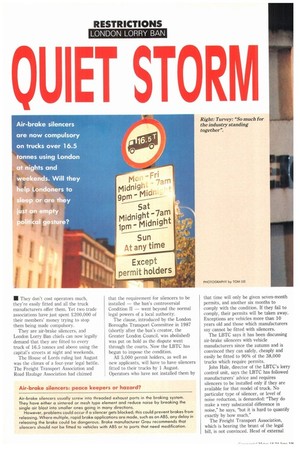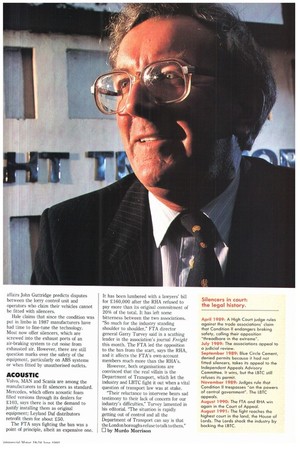QUIET STORM 1
Page 44

Page 45

If you've noticed an error in this article please click here to report it so we can fix it.
RESTRICTIONS
LONDON LORRY BAN
• They don't cost operators much, they're easily fitted and all the truck manufacturers offer them. Yet two trade associations have just spent Z200,000 of their members' money trying to stop them being made compulsory.
They are air-brake silencers, and London Lorry Ban chiefs can now legally demand that they are fitted to every truck of 16.5 tonnes and above using the capital's streets at night and weekends.
The House of Lords ruling last August was the climax of a four-year legal battle. The Freight Transport Association and Road Haulage Association had claimed that the requirement for silencers to be installed — the ban's controversial Condition H — went beyond the normal legal powers of a local authority.
The clause, introduced by the London Boroughs Transport Committee in 1987 (shortly after the ban's creator, the Greater London Council, was abolished) was put on hold as the dispute went through the courts. Now the LBTC has begun to impose the condition.
All 5,000 permit holders, as well as new applicants, will have to have silencers fitted to their trucks by 1 August. Operators who have not installed them by that time will only be given seven-month permits, and another six months to comply with the condition. If they fail to comply, their permits will be taken away. Exceptions are vehicles more than 10 years old and those which manufacturers say cannot be fitted with silencers.
The LBTC says it has been discussing air-brake silencers with vehicle manufacturers since the autumn and is convinced they can safely, cheaply and easily be fitted to 90% of the 38,000 trucks which require permits.
John Hale, director of the LBTC's lorry control unit, says the LBTC has followed manufacturers' advice and requires silencers to be installed only if they are available for that model of truck. No particular type of silencer, or level of noise reduction, is demanded: "They do make a very substantial difference in noise," he says, "but it is hard to quantify exactly by how much."
The Freight Transport Association, which is bearing the brunt of the legal bill, is not convinced. Head of external affairs John Guttridge predicts disputes between the lorry control unit and operators who claim their vehicles cannot be fitted with silencers.
Hale claims that since the condition was put in limbo in 1987 manufacturers have had time to fine-tune the technology. Most now offer silencers, which are screwed into the exhaust ports of an air-braking system to cut noise from exhausted air. However, there are still question marks over the safety of the equipment, particularly on ABS systems or when fitted by unauthorised outlets.
Volvo, MAN and Scania are among the manufacturers to fit silencers as standard. Mercedes, which offers acoustic foam filled versions through its dealers for £103, says there is not the demand to justify installing them as original equipment; Leyland Daf distributors retrofit them for about £50.
The FTA says fighting the ban was a point of principle, albeit an expensive one.
It has been lumbered with a lawyers' bill for £160,000 after the RHA refused to pay more than its original commitment of 20% of the total. It has left some bitterness between the two associations. "So much for the industry standing shoulder to shoulder," FTA director general Garry Turvey said in a scathing leader in the association's journal Freight this month. The FTA led the opposition to the ban from the start, says the RHA, and it affects the FTA's own-account members much more than the RHA's.
However, both organisations are convinced that the real villain is the Department of Transport, which let the industry and LBTC fight it out when a vital question of transport law was at stake.
"Their reluctance to intervene bears sad testimony to their lack of concern for our industry's difficulties," Turvey lamented in his editorial. "The situation is rapidly getting out of control and all the Department of Transport can say is that the London boroughs refuse to talk to them" by Murdo Morrison




















































































